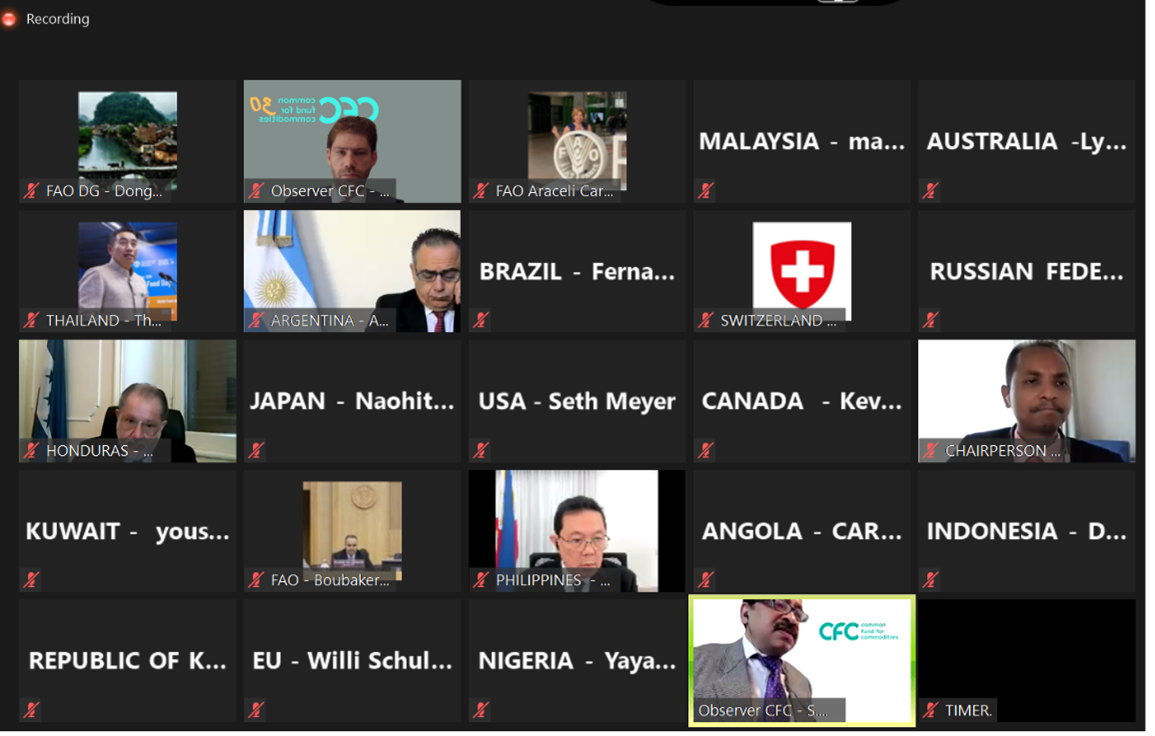CFC participates at the 74th Session of the FAO’s Committee on Commodity Problems (CCP)
From 10 to 12 March 2021, the CFC took part in the 74th Committee on Commodity Problems (CCP) of the Food and Agriculture Organization of the United Nations (FAO). The CCP reviewed the latest developments in food and agricultural markets and examined market outlook, including short and medium-term projections. Moreover, it discussed the finding of the FAO’s publication The State of Agricultural Commodity Markets (SOCO) 2020 on the theme “Agricultural Markets and Sustainable Development: Global value chains, smallholder farmers and digital innovations”. It also provided guidance on FAO’s work programme in commodity markets and trade for the period 2022-25 and beyond.
In his statement, Ambassador Sheikh Mohammed Belal, Managing Director of the CFC, addressed several initiatives to propel a post-pandemic green recovery. As COVID-19 has exacerbated the existing inequalities within different agriculture value chains, recovery can be achieved by unleashing the force of conscious consumers asking for businesses with a purpose. To do so, the market needs to be rebalanced, with businesses becoming more purpose-driven, creating shared value, cooperate, to rewire finance and capital markets to fix the share inequality. It was thus emphasized that the FAO can be sheet anchor in guiding resources for food and agriculture based on its greenness, innovations, and meet the Sustainable Development Goals set for the 2030 Agenda of the United Nations. It was highlighted that the CFC strives for API in its projects, namely, additionality, partnerships and innovations. In this regard, Amb. Belal solicited FAO’s leadership to make innovations far more targeted and expressed his wishes for the CFC to benefit from FAO´s experience on the topic. The CFC hopes to see the FAO as a hub for partnership with private sector-led impact investments and provide more access to the FAO’s Research and Extension Unit (AGDR), the Technologies and Practices for Small Agricultural Producers (TECA) Platform.

Amb. Belal reiterated the CFC’s strengthened support to Small and Medium Enterprises (SMEs) working in the commodities value chain in developing countries. This includes the Emergency Liquidity Facility (ELF) approved by the CFC’s Executive Board in June 2020, with an amount of up to two million USD to support CFC projects affected by the pandemic. The ELF is aimed at providing immediate working capital to qualifying SMEs at risk of terminating their operations. An additional measure is to offer more flexible terms to SMEs facing difficulties caused by the pandemic. This allows the CFC to quickly accommodate the short-term needs of the good projects by for example postponing repayments during moments of crisis. The full statement from Amb. Belal can be found here.
Gustavo Katz Braga, Impact Strategy Officer of the CFC, also participated in the CCP. Referring to the findings of the SOCO 2020, the impact of the emergence of Global Value Chains (GVCs) on the food and agriculture sector was discussed. Indeed, GVCs can be a significant avenue to growth for developing countries on various aspects; yet GVCs can also impose stringent requirements in terms of food quality and safety, which can further marginalize smallholder farmers. Hence, rapid trade growth may be accompanied by increasing inequalities within and among countries. These issues can be tackled by Governments introducing policies to help smallholder farmers to be efficiently and positively integrated with the GVCs. Governments should also create the appropriate environment to help the market to flourish and attract the private sector to give its support. The CFC believes in the power of the private sector to address these challenges and sees the emergence of the impact investing sector as an ideal opportunity to canalize new investments to the agriculture sector in developing countries.
As investments in the agriculture sector are rising, the CFC aims to play a catalytic role in attracting the private capital to projects supporting the commodity dependent developing countries. By supporting SMEs in all levels of the value chain, the CFC aims at generating high impact, thus reducing smallholder producers’ dependency on the commodities market. To illustrate, Mr. Katz Braga presented a project supported by the CFC, namely, Olivado EPZ Limited. Based in Kenya, Olivado is among the world’s leading producers of organic avocado oil, directly sourcing the avocados from 2,200 smallholder farmers, and operates an integrated farmer-to-market model. More information on the project can be found here.
Another issue raised in the SOCO 2020 is the environmental impact associated with the intensification of agricultural production for exports. To counter this, the CFC not only support projects with climate-related components, but it is also concerned about the potential negative environmental impact of its projects. In this regard, the CFC has collaborated with the International Labour Organization (ILO) to develop its Social and Environmental Management System, which allows to assess the social and environmental risks of projects.
A final point mentioned in the SOCO 2020 is the potential impact of digital technologies, which are rapidly transforming all stages of the value chain. This is why the CFC is constantly looking for projects that aim to digitally integrate the most vulnerable actors on the value chains, helping to reduce the digital divide between the urban and rural worlds.
To conclude, the CFC called the United Nations system to collaborate with the international financial institutions to achieve sustainable development, requiring cooperation between the FAO and the likes of the CFC. The issue of financing gap for implementation of SDGs make it obligatory for all of us to look for more collaborations amongst the members of UN system and others. CFC appreciates FAO’s role in leading this process primarily for commodity producing developing countries.

